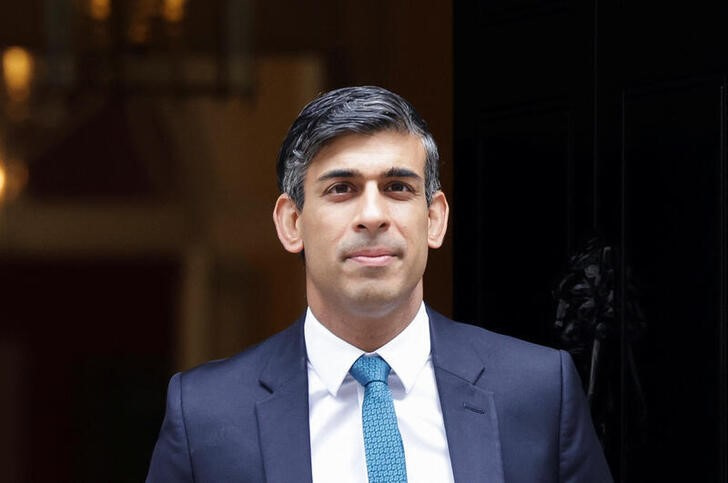UK Prime Minister Sunak underscores vapes as safer alternative to cigarettes

FILE PHOTO: British Prime Minister Rishi Sunak walks outside 10 Downing Street in London, Britain, July 19, 2023. REUTERS/Anna Gordon
Advocates of public health in the country applauded UK Prime Minister Rishi Sunak for promoting vaping as a much safer alternative to smoking cigarettes and establishing groundbreaking programs that “encourage adults to make informed choices rather than imposing bans that leave them with limited options.”
“No less than a leader of the free world has proclaimed that vaping is a better choice for those who can’t quit smoking. There is so much science and research today that back up his claim. We congratulate Prime Minister Sunak for doing the right thing in protecting the British people’s health,” Clarisse Virgino, the Philippine representative to the Coalition of Asia Pacific Tobacco Harm Reduction Advocates (CAPHRA), said.
When challenged in parliament on how the UK’s National Health Service could be relieved of mounting pressures, Sunak pointed to his administration’s anti-smoking policy as the key. Central to the policy is an innovative scheme to trade one million free vapes for cigarettes in what is dubbed as the “swap to stop” program.
“There is such persuasive evidence from that program and the schemes that we have done on a smaller scale that if you can help existing adult smokers to switch away from smoking to using vapes -this is not about disposable vapes for children, which is obviously concerning … there are clearly public health benefits of acting before the bigger problems come down the line,” the Prime Minister was quoted as saying.
READ: Seven-year evidence shows vaping remains far less harmful than smoking
Article continues after this advertisement“Policy makers around the world should take a cue from Sunak’s administration which considers science in its efforts to address the smoking epidemic in the UK. Rather than demonizing vaping, the UK promotes it as a proactive and innovative way to win people away from smoking and give them a better choice,” Dr. Lorenzo Mata, president of advocacy group Quit for Good, said.
Article continues after this advertisementVapes, heated tobacco products and nicotine pouches are innovative alternatives that deliver nicotine without burning tobacco. Mounting scientific studies have concluded that burning tobacco produces around 7,000 chemicals in cigarettes smoke, more than 200 of which are harmful or potentially harmful to humans. Nicotine, though not risk-free, is not the cause of smoking related diseases.
Dr. Mata noted that this development, “also proves that the Philippines moved in the right direction when it passed Republic Act No. 11900, or the Vaporized Nicotine and Non-nicotine Products Act to regulate vapes, heated tobacco and other smoke-free products.”
The UK is giving free vape starter kits, along with behavioral support, to one million smokers in a national campaign to reduce smoking. About one in five smokers in England will receive the kits.

This photo shows Clarisse Virgino, the Philippine representative to the Coalition of Asia Pacific Harm Reduction Advocates or CAPHRA. Contributed photo
Virgino said, “This progressive and pro-science approach offers the best opportunity to end smoking, which tobacco control espoused by the WHO and the Framework Convention on Tobacco Control (FCT) has failed to accomplish over the decades. By providing 1 million free vapes, the UK recognizes the role of tobacco harm reduction in making a difference in the lives of smokers. It hopes that the ‘swap-to-stop’ scheme will hasten the decline of smoking in England,” she noted.
READ: Britain to encourage smokers to swap cigarettes for vapes
Sunak underscored the importance of his government’s “swap to stop” program to improve public health, which involves promoting vaping as a much safer alternative to smoking cigarettes and is part of a strategy that encourages adults to make informed choices rather than imposing bans that leave them with limited options.
“On smoking, the ‘swap to stop’ program is trying something quite proactive … quite innovative,” he said.
Consumer groups and public health advocates in the Philippines said the UK’s decision should serve as a wake-up call to countries that continue to adhere to the World Health Organization’s moralist, but ineffectual tobacco control policy that condemns smokers to a lifetime of smoking without presenting viable alternatives.
According to Virgino, the UK government’s stance in favor of smoke-free alternatives by providing vapes to smokers is the biggest challenge yet to the WHO’s restrictive and prohibitionist policy that sidelines over a billion smokers in the world, most of whom live in the Asia-Pacific region.
READ: Vapes, HTPs less harmful alternatives to cigarettes – top health institutions
“This is what happens when you have a leader who looks at all sides to an issue. The quit-or-die approach being peddled by the WHO and embraced by one-track-minded politicians will only result in unnecessary deaths due to smoking. If there are better alternatives available, smokers should not be deprived of them. As Prime Minister Sunak said ‘if you can help existing adult smokers to switch away from smoking to using vapes…there are clearly public health benefits of acting before the bigger problems come down the line’,” said Virgino
The UK’s Department of Health and Social Care said the program proved effective in local trials, so it is being scaled up at the national level. The plan also includes giving financial incentives of up to £400 for pregnant women who quit smoking.
Vaping proved helpful in making people quit smoking in the UK, as research shows that “smokers who use a vape every day are three times more likely to quit smoking”.
The measures are also part of the UK government’s plan to achieve “smoke-free” status by 2030. “Smokefree” is defined as smoking prevalence of five percent or less.
READ: Vape Bill to help Filipino smokers transition to less harmful alternatives, gov’t execs say
About 5.4 million people in England currently smoke, and studies show that two of three lifelong smokers will eventually die from smoking.
The program also includes a crackdown on underage and illicit vape sales.
Despite the WHO’s opposition to smoke-free alternatives, a 2015 WHO study group on tobacco product regulation found that “less toxic or less addictive’ products ‘could be a component of a comprehensive approach to reducing tobacco-related deaths and disease.”